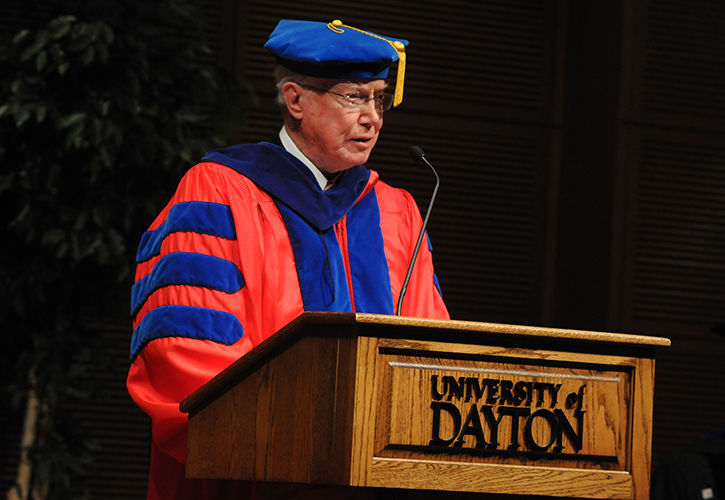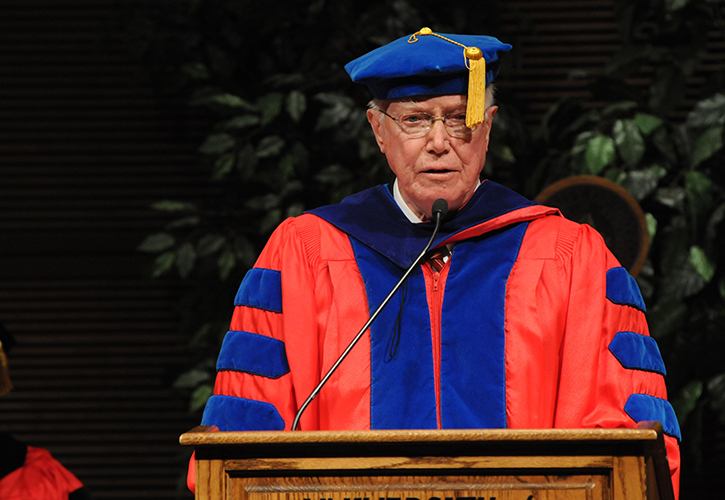College of Arts and Sciences Newsroom

In memoriam: J. Philip Gleason ’51, alumnus and American Catholic historian
By Anthony B. Smith
Philip Gleason ’51, an eminent American historian, University of Dayton alumnus, professor of history at the University of Notre Dame and recipient of UD’s Marianist Award, died Jan. 17. He was 96.
Gleason was a highly regarded historian whose work and teaching made a lasting and important impact on the study of American Catholic history.
Gleason wrote Contending with Modernity: Catholic Higher Education in the Twentieth Century, a seminal 1995 work in Catholic intellectual history in the U.S. His first book, The Conservative Reformers: German-American Catholics and the Social Order, published in 1968, encouraged historians to take religion seriously as a component of ethnic and immigration history. Keeping the Faith: American Catholicism Past and Present, published in 1987, collected some of Gleason’s most important essays on American Catholic history.
While Gleason was an expert in the history of American Catholicism, his work also crossed numerous fields, including immigration history, intellectual history and American studies. His article, “American Identity and Americanization,” in the Harvard Encyclopedia of American Ethnic Groups was widely cited and influential among American historians. Throughout his career, Gleason published numerous articles on diversity and pluralism in American history. Many of his most important articles on these subjects were collected in Speaking of Diversity: Language and Ethnicity in Twentieth-Century America, published in 1992.
In addition to his scholarship, Gleason enjoyed a long career as a professor of history at the University of Notre Dame, where peers and students admired him. He served as chair of the history department from 1971-1974. He taught at Notre Dame for 47 years.
Gleason’s scholarly and professional contributions were widely recognized. Gleason received the University of Dayton’s Marianist Award in 1994 for distinguished Catholic achievement in scholarship and intellectual life. He also was awarded an honorary degree from UD in 2011.
In 1999, he won the University of Notre Dame’s Laetare Award, the school’s highest award given to an American Catholic. The American Catholic Historical Association awarded Gleason its Distinguished Scholarship Award in 2019. The ACHA bestowed Gleason with the award, “[f]or the breadth and depth of his contribution to the study of the American past, for his prominence in the field of American Catholic history and beyond, for his extraordinary generosity as a scholar, and for the generations of students he has mentored and influenced.”
Gleason was president of the American Catholic Historical Association in 1978. He also served nine years on the executive board of the Immigration and Ethnic History Society, including three years as its president, from 1997-2000. In addition, he chaired the Catholic Commission on Intellectual and Cultural Affairs from 1986-88.

Born in Wilmington, Ohio, Gleason studied secondary education at the University of Dayton and graduated in 1951. He served in the U.S. Army in 1946. He pursued graduate studies in history at the University of Notre Dame, earning a master’s degree in 1955, and a doctorate. in 1960.
Gleason’s influence was extensive and he never forgot his ties to UD. His scholarship and friendship reached many people here at UD who shared his professional interest in the study of American Catholicism. Faculty, particularly in the departments of religious studies and history, benefited from his generosity, mentorship and support.
Gleason cast a long shadow as a model historian for many. UD Professor of History Una Cadegan recalled Gleason’s presence at regular scholarly conversations sponsored by Notre Dame’s Cushwa Center for the Study of American Catholicism, where he would be ready to discuss an author’s publication, complete with “yellow sticky notes through it, prepared to ask incisive and generous questions.”
As president of the American Catholic Historical Association, I’m deeply aware of Philip’s contribution to the development of the study of American Catholicism into an integral part of American history. My first encounter with his work was as a graduate student in American studies at the University of Minnesota, reading his Harvard Encyclopedia essay for a seminar. It was through his explorations on questions of American identity that I initially learned about Philip Gleason. But as I sought to connect Catholics to a wider American experience, Phil’s work also was already there, leading the way as it were, with his numerous publications in Catholic history — testimony to the breadth of Phil’s scholarship to speak across diverse areas of study.
A remarkable historian, Philip Gleason helped open doors that many of us have been able to walk through. Without his sustained labor and persistent dedication, those of us who study the history of American Catholicism would be enormously impoverished.
Gleason is survived by Maureen, his wife of 66 years, four children and five grandchildren. Funeral services were held Jan. 25 at the Basilica of the Sacred Heart in Notre Dame, Indiana.
A full obituary can be found here.
Anthony B. Smith is an associate professor of religious studies at the University of Dayton.
